Johnson, Whittington and Scholes , Exploring Strategy

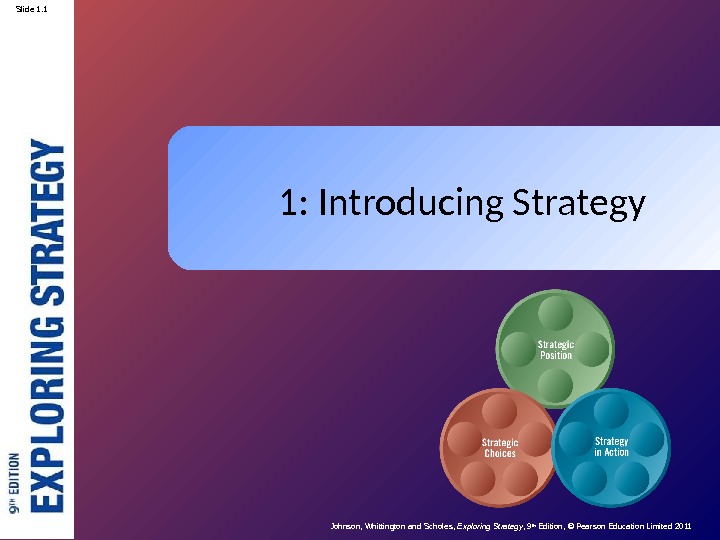
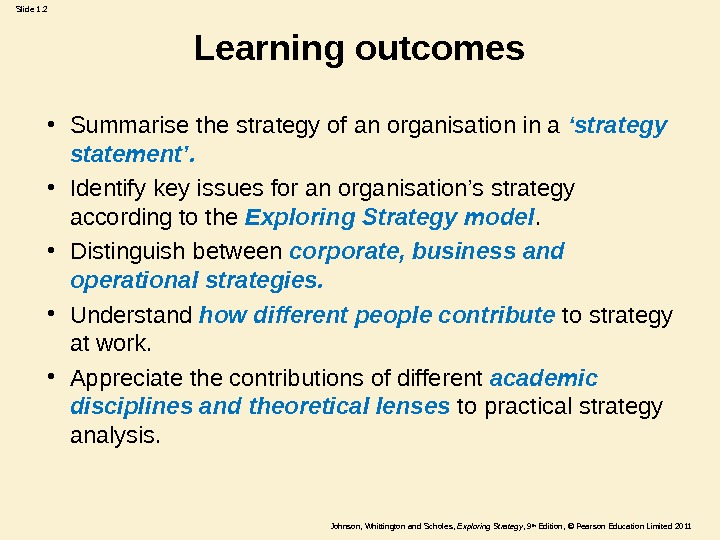

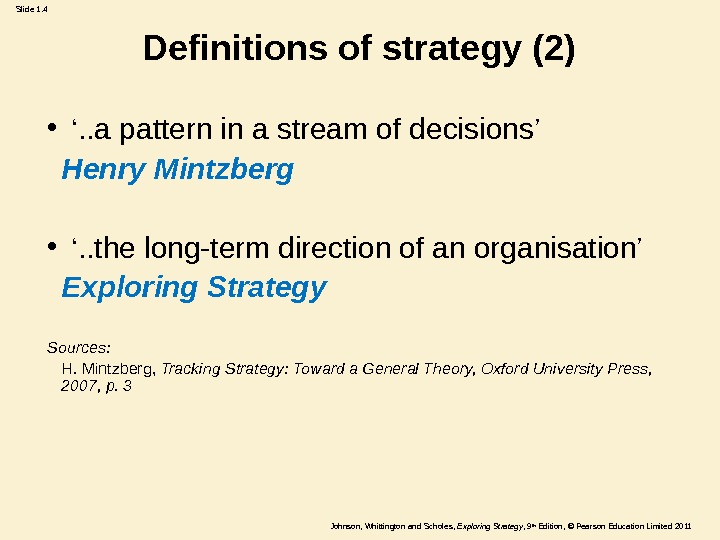
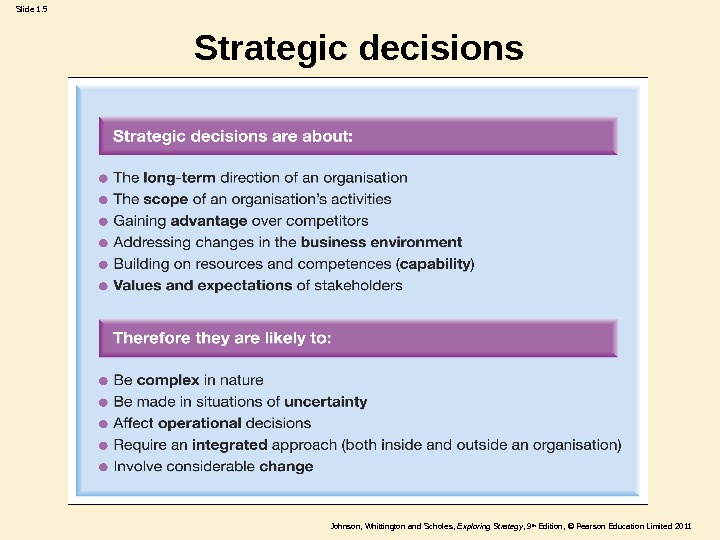

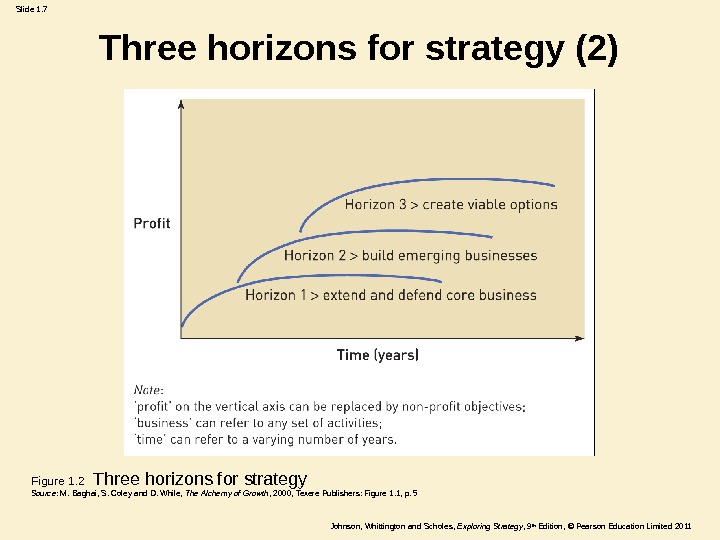

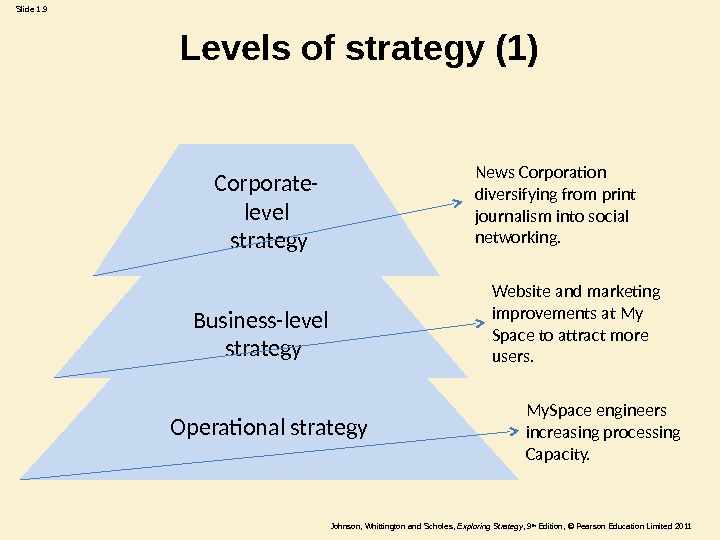
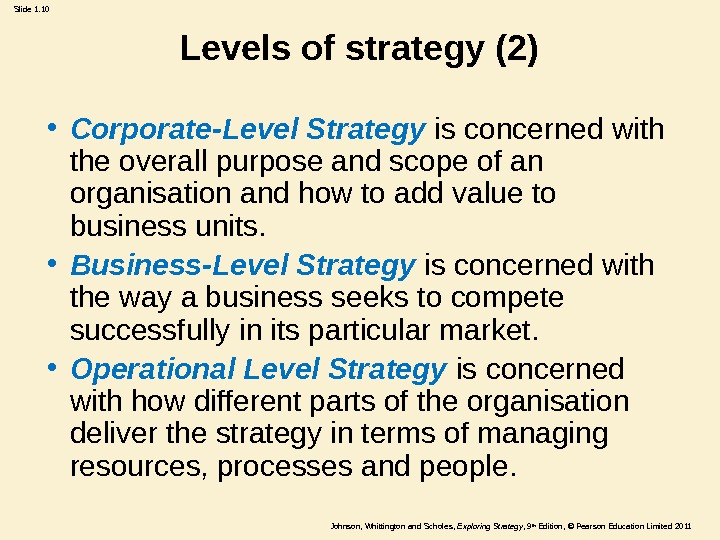
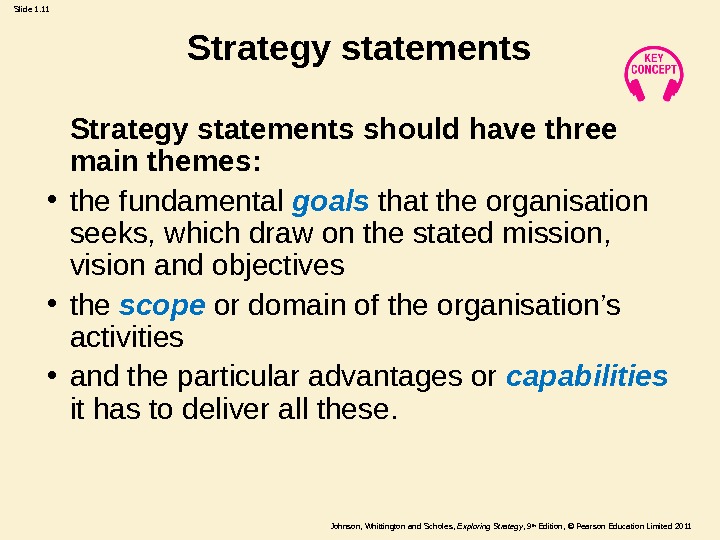
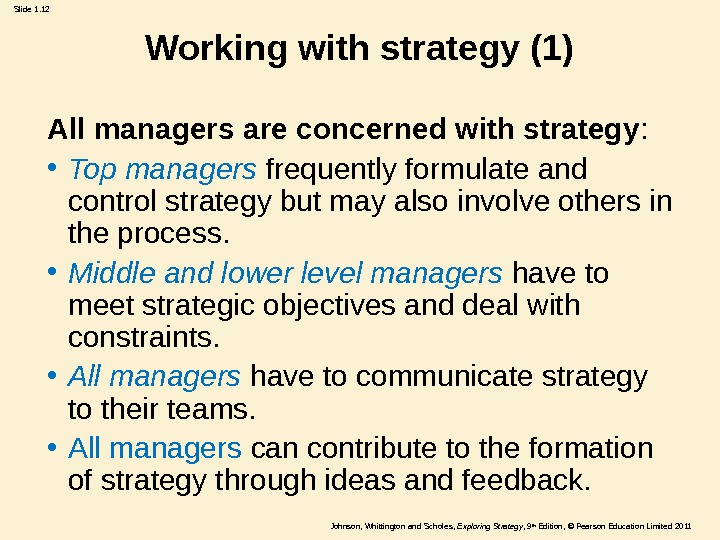
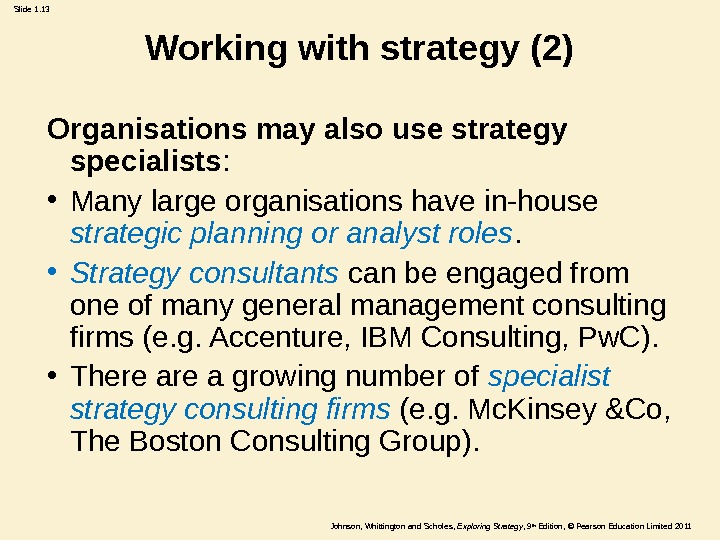
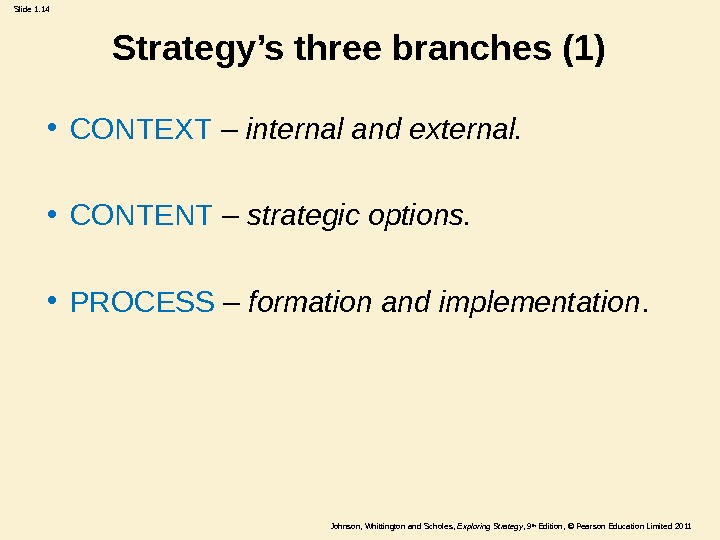
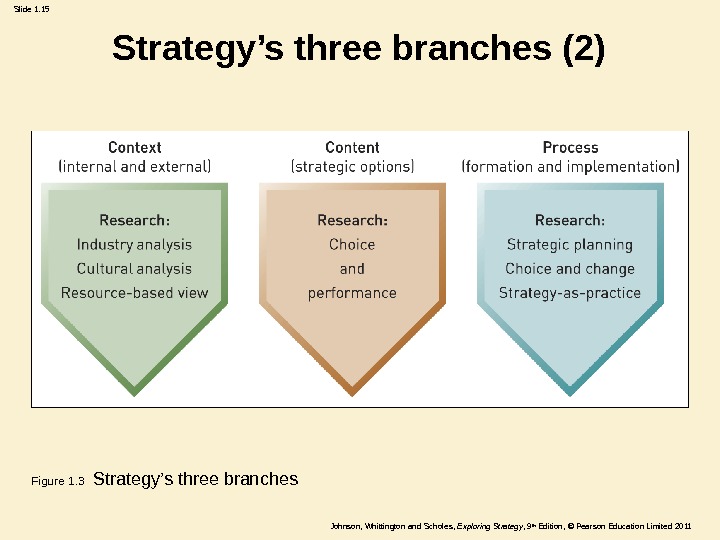
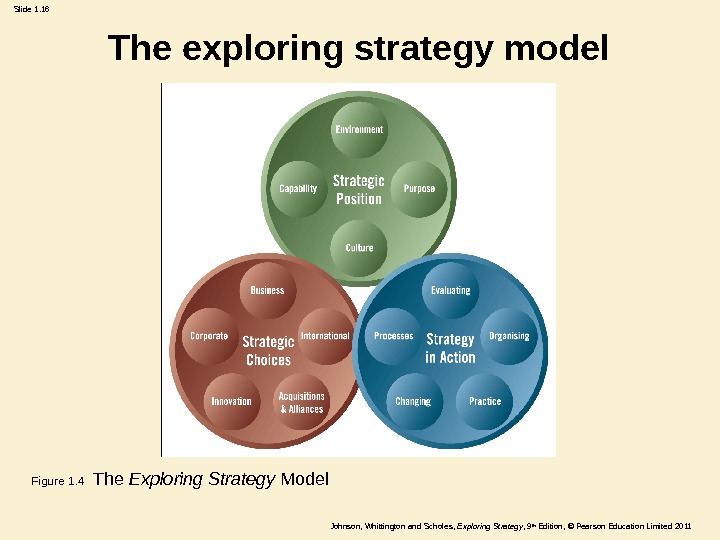
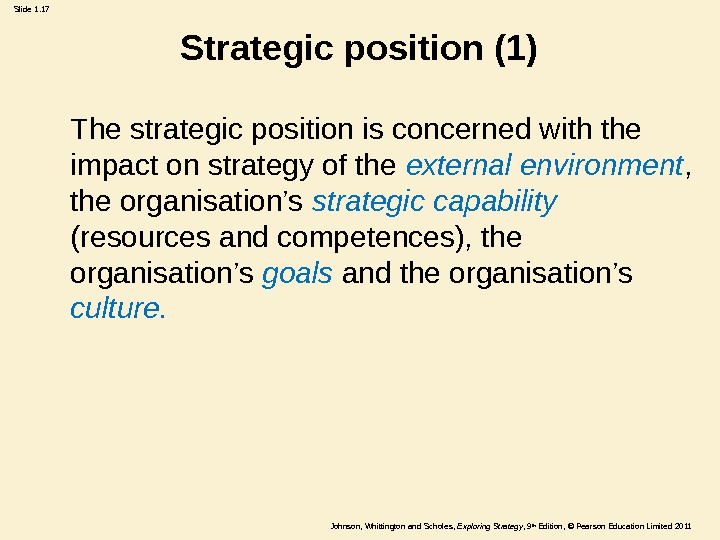
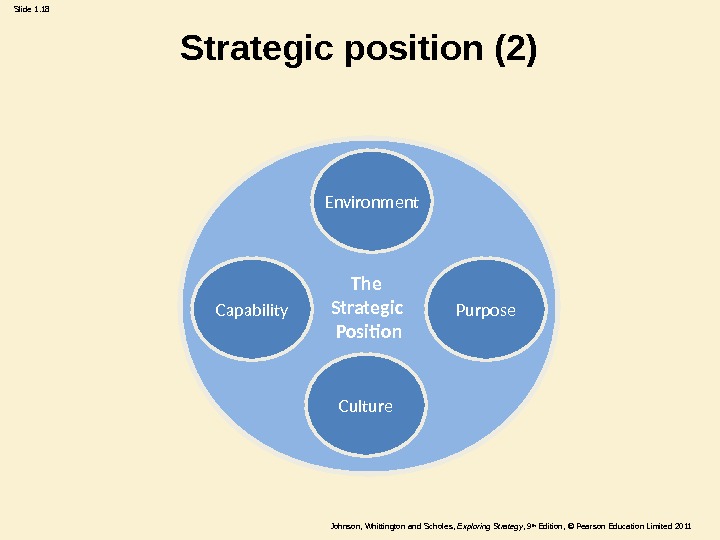
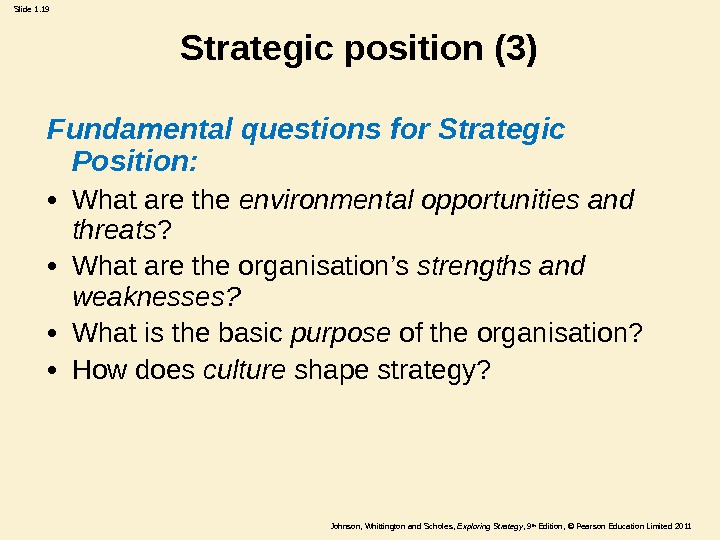
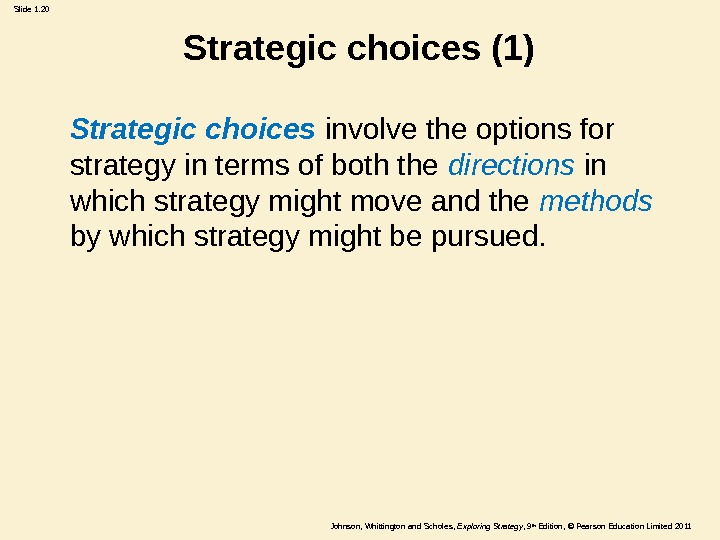
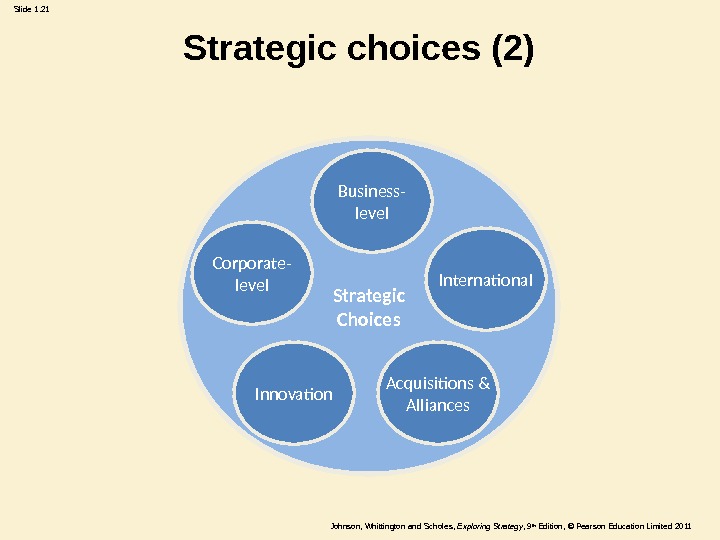
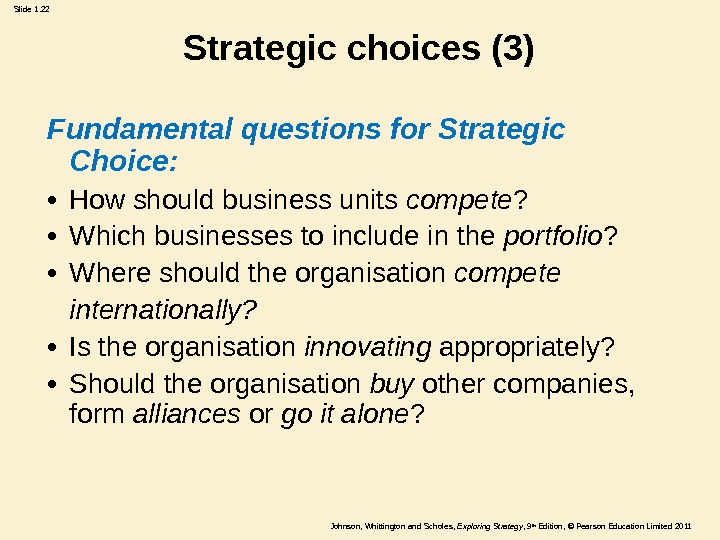

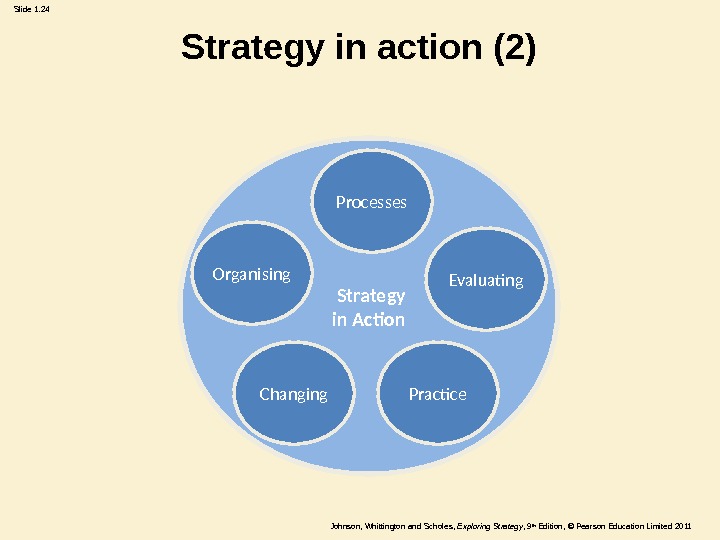


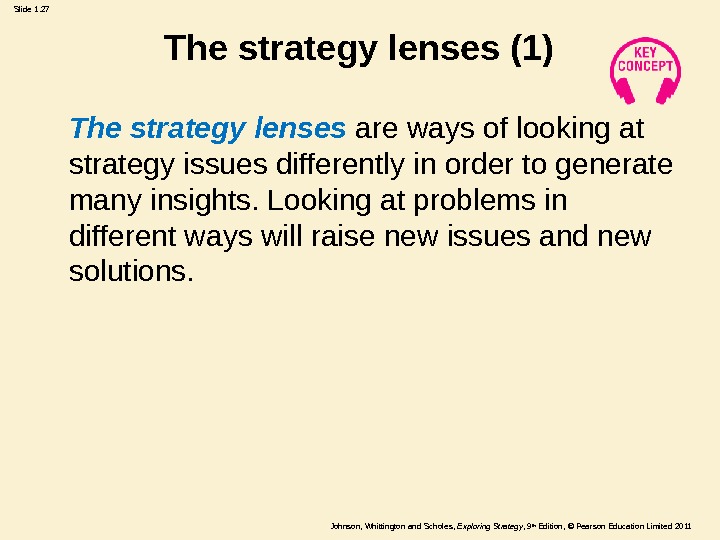
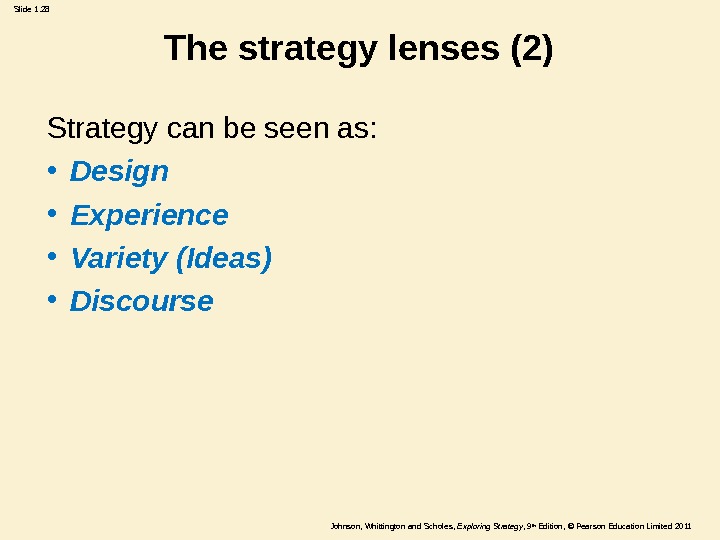
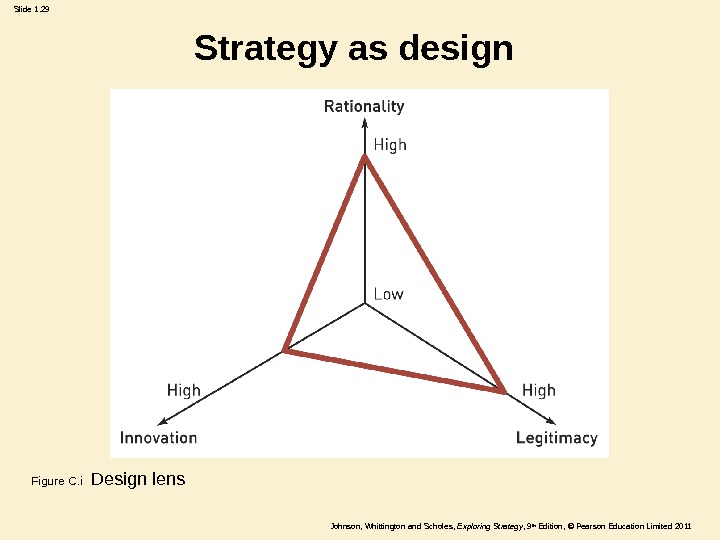
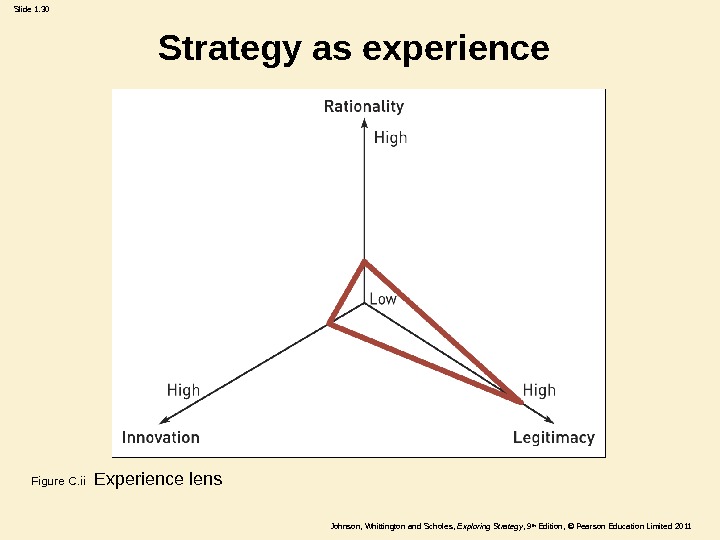
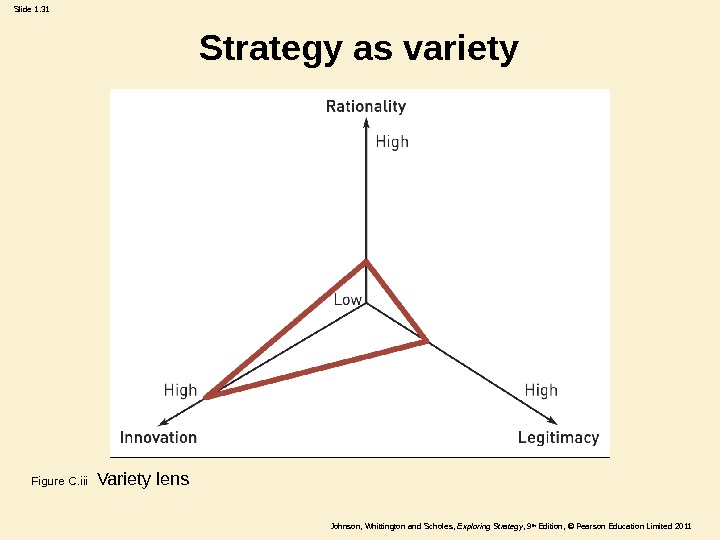
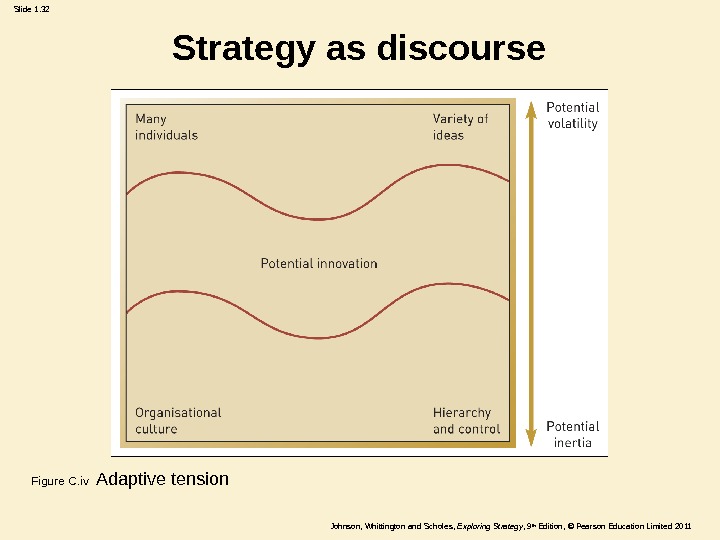

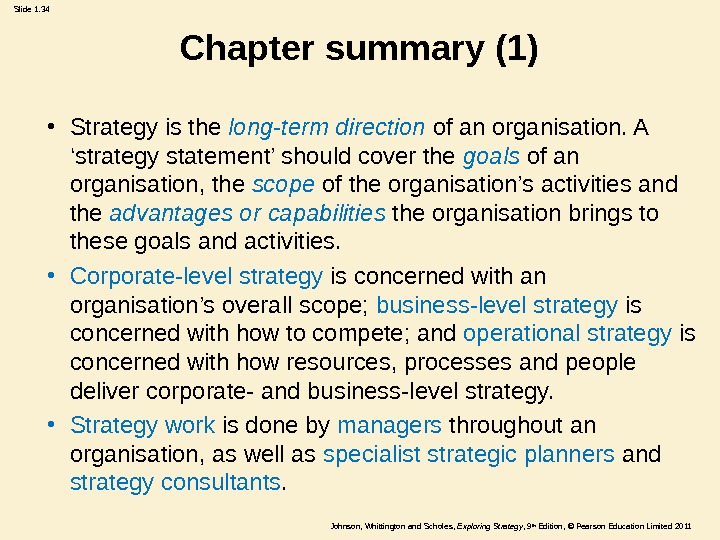
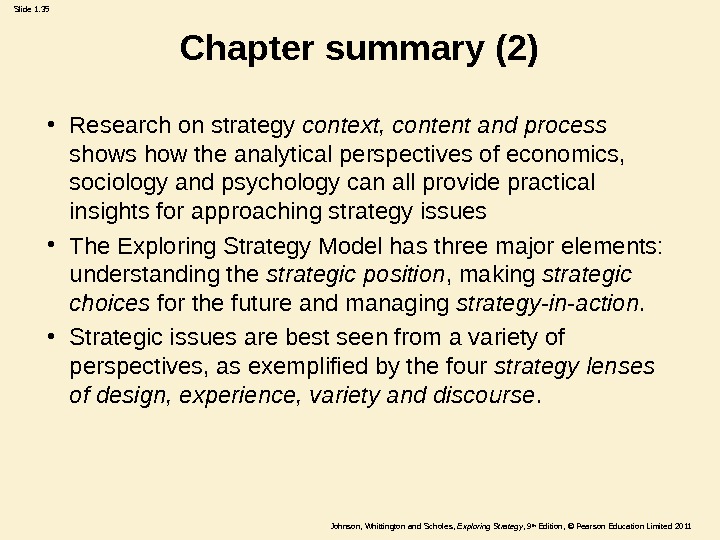
johnson_and_scholes_pp01_introducing_strategy_9th_ed.ppt
- Размер: 1.1 Mегабайта
- Количество слайдов: 35
Описание презентации Johnson, Whittington and Scholes , Exploring Strategy по слайдам
 Johnson, Whittington and Scholes , Exploring Strategy , 9 th Edition, © Pearson Education Limited 2011 Slide 1. 1 1: Introducing Strategy
Johnson, Whittington and Scholes , Exploring Strategy , 9 th Edition, © Pearson Education Limited 2011 Slide 1. 1 1: Introducing Strategy
 Johnson, Whittington and Scholes , Exploring Strategy , 9 th Edition, © Pearson Education Limited 2011 Slide 1. 2 Learning outcomes • Summarise the strategy of an organisation in a ‘strategy statement’. • Identify key issues for an organisation’s strategy according to the Exploring Strategy model. • Distinguish between corporate, business and operational strategies. • Understand how different people contribute to strategy at work. • Appreciate the contributions of different academic disciplines and theoretical lenses to practical strategy analysis.
Johnson, Whittington and Scholes , Exploring Strategy , 9 th Edition, © Pearson Education Limited 2011 Slide 1. 2 Learning outcomes • Summarise the strategy of an organisation in a ‘strategy statement’. • Identify key issues for an organisation’s strategy according to the Exploring Strategy model. • Distinguish between corporate, business and operational strategies. • Understand how different people contribute to strategy at work. • Appreciate the contributions of different academic disciplines and theoretical lenses to practical strategy analysis.
 Johnson, Whittington and Scholes , Exploring Strategy , 9 th Edition, © Pearson Education Limited 2011 Slide 1. 3 Definitions of strategy (1) • ‘. . the determination of the long-run goals and objectives of an enterprise and the adoption of courses of action and the allocation of resource necessary for carrying out these goals’ Alfred Chandler • ‘ Competitive strategy is about being different. It means deliberately choosing a different set of activities to deliver a unique mix of value’ Michael Porter Sources: A. D. Chandler, Strategy and Structure: Chapters in the History of American Enterprise, MIT Press, 1963, p. 13 M. E. Porter, ‘What is strategy? ’, Harvard Business Review, 1996, November–December, p.
Johnson, Whittington and Scholes , Exploring Strategy , 9 th Edition, © Pearson Education Limited 2011 Slide 1. 3 Definitions of strategy (1) • ‘. . the determination of the long-run goals and objectives of an enterprise and the adoption of courses of action and the allocation of resource necessary for carrying out these goals’ Alfred Chandler • ‘ Competitive strategy is about being different. It means deliberately choosing a different set of activities to deliver a unique mix of value’ Michael Porter Sources: A. D. Chandler, Strategy and Structure: Chapters in the History of American Enterprise, MIT Press, 1963, p. 13 M. E. Porter, ‘What is strategy? ’, Harvard Business Review, 1996, November–December, p.
 Johnson, Whittington and Scholes , Exploring Strategy , 9 th Edition, © Pearson Education Limited 2011 Slide 1. 4 Definitions of strategy (2) • ‘. . a pattern in a stream of decisions’ Henry Mintzberg • ‘. . the long-term direction of an organisation’ Exploring Strategy Sources: H. Mintzberg, Tracking Strategy: Toward a General Theory, Oxford University Press, 2007, p.
Johnson, Whittington and Scholes , Exploring Strategy , 9 th Edition, © Pearson Education Limited 2011 Slide 1. 4 Definitions of strategy (2) • ‘. . a pattern in a stream of decisions’ Henry Mintzberg • ‘. . the long-term direction of an organisation’ Exploring Strategy Sources: H. Mintzberg, Tracking Strategy: Toward a General Theory, Oxford University Press, 2007, p.
 Johnson, Whittington and Scholes , Exploring Strategy , 9 th Edition, © Pearson Education Limited 2011 Slide 1. 5 Strategic decisions
Johnson, Whittington and Scholes , Exploring Strategy , 9 th Edition, © Pearson Education Limited 2011 Slide 1. 5 Strategic decisions
 Johnson, Whittington and Scholes , Exploring Strategy , 9 th Edition, © Pearson Education Limited 2011 Slide 1. 6 Three horizons for strategy (1) • Horizon 1 : Extend and defend core business. • Horizon 2 : Build emerging businesses. • Horizon 3 : Create viable options.
Johnson, Whittington and Scholes , Exploring Strategy , 9 th Edition, © Pearson Education Limited 2011 Slide 1. 6 Three horizons for strategy (1) • Horizon 1 : Extend and defend core business. • Horizon 2 : Build emerging businesses. • Horizon 3 : Create viable options.
 Johnson, Whittington and Scholes , Exploring Strategy , 9 th Edition, © Pearson Education Limited 2011 Slide 1. 7 Three horizons for strategy (2) Figure 1. 2 Three horizons for strategy Source : M. Baghai, S. Coley and D. While, The Alchemy of Growth , 2000, Texere Publishers: Figure 1. 1, p.
Johnson, Whittington and Scholes , Exploring Strategy , 9 th Edition, © Pearson Education Limited 2011 Slide 1. 7 Three horizons for strategy (2) Figure 1. 2 Three horizons for strategy Source : M. Baghai, S. Coley and D. While, The Alchemy of Growth , 2000, Texere Publishers: Figure 1. 1, p.
 Johnson, Whittington and Scholes , Exploring Strategy , 9 th Edition, © Pearson Education Limited 2011 Slide 1. 8 Stakeholders are those individuals or groups that depend on an organisation to fulfil their own goals and on whom, in turn, the organisation depends.
Johnson, Whittington and Scholes , Exploring Strategy , 9 th Edition, © Pearson Education Limited 2011 Slide 1. 8 Stakeholders are those individuals or groups that depend on an organisation to fulfil their own goals and on whom, in turn, the organisation depends.
 Johnson, Whittington and Scholes , Exploring Strategy , 9 th Edition, © Pearson Education Limited 2011 Slide 1. 9 Levels of strategy (1) Operational strategy Business-level strategy. Corporate- level strategy News Corporation diversifying from print journalism into social networking. Website and marketing improvements at My Space to attract more users. My. Space engineers increasing processing Capacity.
Johnson, Whittington and Scholes , Exploring Strategy , 9 th Edition, © Pearson Education Limited 2011 Slide 1. 9 Levels of strategy (1) Operational strategy Business-level strategy. Corporate- level strategy News Corporation diversifying from print journalism into social networking. Website and marketing improvements at My Space to attract more users. My. Space engineers increasing processing Capacity.
 Johnson, Whittington and Scholes , Exploring Strategy , 9 th Edition, © Pearson Education Limited 2011 Slide 1. 10 Levels of strategy (2) • Corporate-Level Strategy is concerned with the overall purpose and scope of an organisation and how to add value to business units. • Business-Level Strategy is concerned with the way a business seeks to compete successfully in its particular market. • Operational Level Strategy is concerned with how different parts of the organisation deliver the strategy in terms of managing resources, processes and people.
Johnson, Whittington and Scholes , Exploring Strategy , 9 th Edition, © Pearson Education Limited 2011 Slide 1. 10 Levels of strategy (2) • Corporate-Level Strategy is concerned with the overall purpose and scope of an organisation and how to add value to business units. • Business-Level Strategy is concerned with the way a business seeks to compete successfully in its particular market. • Operational Level Strategy is concerned with how different parts of the organisation deliver the strategy in terms of managing resources, processes and people.
 Johnson, Whittington and Scholes , Exploring Strategy , 9 th Edition, © Pearson Education Limited 2011 Slide 1. 11 Strategy statements should have three main themes: • the fundamental goals that the organisation seeks, which draw on the stated mission, vision and objectives • the scope or domain of the organisation’s activities • and the particular advantages or capabilities it has to deliver all these.
Johnson, Whittington and Scholes , Exploring Strategy , 9 th Edition, © Pearson Education Limited 2011 Slide 1. 11 Strategy statements should have three main themes: • the fundamental goals that the organisation seeks, which draw on the stated mission, vision and objectives • the scope or domain of the organisation’s activities • and the particular advantages or capabilities it has to deliver all these.
 Johnson, Whittington and Scholes , Exploring Strategy , 9 th Edition, © Pearson Education Limited 2011 Slide 1. 12 Working with strategy (1) All managers are concerned with strategy : • Top managers frequently formulate and control strategy but may also involve others in the process. • Middle and lower level managers have to meet strategic objectives and deal with constraints. • All managers have to communicate strategy to their teams. • All managers can contribute to the formation of strategy through ideas and feedback.
Johnson, Whittington and Scholes , Exploring Strategy , 9 th Edition, © Pearson Education Limited 2011 Slide 1. 12 Working with strategy (1) All managers are concerned with strategy : • Top managers frequently formulate and control strategy but may also involve others in the process. • Middle and lower level managers have to meet strategic objectives and deal with constraints. • All managers have to communicate strategy to their teams. • All managers can contribute to the formation of strategy through ideas and feedback.
 Johnson, Whittington and Scholes , Exploring Strategy , 9 th Edition, © Pearson Education Limited 2011 Slide 1. 13 Working with strategy (2) Organisations may also use strategy specialists : • Many large organisations have in-house strategic planning or analyst roles. • Strategy consultants can be engaged from one of many general management consulting firms (e. g. Accenture, IBM Consulting, Pw. C). • There a growing number of specialist strategy consulting firms (e. g. Mc. Kinsey &Co, The Boston Consulting Group).
Johnson, Whittington and Scholes , Exploring Strategy , 9 th Edition, © Pearson Education Limited 2011 Slide 1. 13 Working with strategy (2) Organisations may also use strategy specialists : • Many large organisations have in-house strategic planning or analyst roles. • Strategy consultants can be engaged from one of many general management consulting firms (e. g. Accenture, IBM Consulting, Pw. C). • There a growing number of specialist strategy consulting firms (e. g. Mc. Kinsey &Co, The Boston Consulting Group).
 Johnson, Whittington and Scholes , Exploring Strategy , 9 th Edition, © Pearson Education Limited 2011 Slide 1. 14 Strategy’s three branches (1) • CONTEXT – internal and external. • CONTENT – strategic options. • PROCESS – formation and implementation.
Johnson, Whittington and Scholes , Exploring Strategy , 9 th Edition, © Pearson Education Limited 2011 Slide 1. 14 Strategy’s three branches (1) • CONTEXT – internal and external. • CONTENT – strategic options. • PROCESS – formation and implementation.
 Johnson, Whittington and Scholes , Exploring Strategy , 9 th Edition, © Pearson Education Limited 2011 Slide 1. 15 Strategy’s three branches (2) Figure 1. 3 Strategy’s three branches
Johnson, Whittington and Scholes , Exploring Strategy , 9 th Edition, © Pearson Education Limited 2011 Slide 1. 15 Strategy’s three branches (2) Figure 1. 3 Strategy’s three branches
 Johnson, Whittington and Scholes , Exploring Strategy , 9 th Edition, © Pearson Education Limited 2011 Slide 1. 16 The exploring strategy model Figure 1. 4 The Exploring Strategy Model
Johnson, Whittington and Scholes , Exploring Strategy , 9 th Edition, © Pearson Education Limited 2011 Slide 1. 16 The exploring strategy model Figure 1. 4 The Exploring Strategy Model
 Johnson, Whittington and Scholes , Exploring Strategy , 9 th Edition, © Pearson Education Limited 2011 Slide 1. 17 Strategic position (1) The strategic position is concerned with the impact on strategy of the external environment , the organisation’s strategic capability (resources and competences), the organisation’s goals and the organisation’s culture.
Johnson, Whittington and Scholes , Exploring Strategy , 9 th Edition, © Pearson Education Limited 2011 Slide 1. 17 Strategic position (1) The strategic position is concerned with the impact on strategy of the external environment , the organisation’s strategic capability (resources and competences), the organisation’s goals and the organisation’s culture.
 Johnson, Whittington and Scholes , Exploring Strategy , 9 th Edition, © Pearson Education Limited 2011 Slide 1. 18 Strategic position (2) The Strategic Position. Environment Culture Purpose. Capability
Johnson, Whittington and Scholes , Exploring Strategy , 9 th Edition, © Pearson Education Limited 2011 Slide 1. 18 Strategic position (2) The Strategic Position. Environment Culture Purpose. Capability
 Johnson, Whittington and Scholes , Exploring Strategy , 9 th Edition, © Pearson Education Limited 2011 Slide 1. 19 Strategic position (3) Fundamental questions for Strategic Position: • What are the environmental opportunities and threats ? • What are the organisation’s strengths and weaknesses? • What is the basic purpose of the organisation? • How does culture shape strategy?
Johnson, Whittington and Scholes , Exploring Strategy , 9 th Edition, © Pearson Education Limited 2011 Slide 1. 19 Strategic position (3) Fundamental questions for Strategic Position: • What are the environmental opportunities and threats ? • What are the organisation’s strengths and weaknesses? • What is the basic purpose of the organisation? • How does culture shape strategy?
 Johnson, Whittington and Scholes , Exploring Strategy , 9 th Edition, © Pearson Education Limited 2011 Slide 1. 20 Strategic choices (1) Strategic choices involve the options for strategy in terms of both the directions in which strategy might move and the methods by which strategy might be pursued.
Johnson, Whittington and Scholes , Exploring Strategy , 9 th Edition, © Pearson Education Limited 2011 Slide 1. 20 Strategic choices (1) Strategic choices involve the options for strategy in terms of both the directions in which strategy might move and the methods by which strategy might be pursued.
 Johnson, Whittington and Scholes , Exploring Strategy , 9 th Edition, © Pearson Education Limited 2011 Slide 1. 21 Strategic choices (2) Strategic Choices Business- level Innovation International. Corporate- level Acquisitions & Alliances
Johnson, Whittington and Scholes , Exploring Strategy , 9 th Edition, © Pearson Education Limited 2011 Slide 1. 21 Strategic choices (2) Strategic Choices Business- level Innovation International. Corporate- level Acquisitions & Alliances
 Johnson, Whittington and Scholes , Exploring Strategy , 9 th Edition, © Pearson Education Limited 2011 Slide 1. 22 Strategic choices (3) Fundamental questions for Strategic Choice: • How should business units compete ? • Which businesses to include in the portfolio ? • Where should the organisation compete internationally? • Is the organisation innovating appropriately? • Should the organisation buy other companies, form alliances or go it alone ?
Johnson, Whittington and Scholes , Exploring Strategy , 9 th Edition, © Pearson Education Limited 2011 Slide 1. 22 Strategic choices (3) Fundamental questions for Strategic Choice: • How should business units compete ? • Which businesses to include in the portfolio ? • Where should the organisation compete internationally? • Is the organisation innovating appropriately? • Should the organisation buy other companies, form alliances or go it alone ?
 Johnson, Whittington and Scholes , Exploring Strategy , 9 th Edition, © Pearson Education Limited 2011 Slide 1. 23 Strategy in action (1) Strategy in action is about how strategies are formed and how they are implemented. The emphasis is on the practicalities of managing.
Johnson, Whittington and Scholes , Exploring Strategy , 9 th Edition, © Pearson Education Limited 2011 Slide 1. 23 Strategy in action (1) Strategy in action is about how strategies are formed and how they are implemented. The emphasis is on the practicalities of managing.
 Johnson, Whittington and Scholes , Exploring Strategy , 9 th Edition, © Pearson Education Limited 2011 Slide 1. 24 Strategy in action (2) Strategy in Action Processes Changing Evaluating. Organising Practice
Johnson, Whittington and Scholes , Exploring Strategy , 9 th Edition, © Pearson Education Limited 2011 Slide 1. 24 Strategy in action (2) Strategy in Action Processes Changing Evaluating. Organising Practice
 Johnson, Whittington and Scholes , Exploring Strategy , 9 th Edition, © Pearson Education Limited 2011 Slide 1. 25 Strategy in action (3) Fundamental questions for Strategy in Action • Which strategies are suitable, acceptable and feasible? • What kind of strategy-making process is needed? • What are the required organisation structures and systems ? • How should the organisation manage necessary changes ? • Who should do what in the strategy process ?
Johnson, Whittington and Scholes , Exploring Strategy , 9 th Edition, © Pearson Education Limited 2011 Slide 1. 25 Strategy in action (3) Fundamental questions for Strategy in Action • Which strategies are suitable, acceptable and feasible? • What kind of strategy-making process is needed? • What are the required organisation structures and systems ? • How should the organisation manage necessary changes ? • Who should do what in the strategy process ?
 Johnson, Whittington and Scholes , Exploring Strategy , 9 th Edition, © Pearson Education Limited 2011 Slide 1. 26 Exploring strategy in different contexts The Exploring Strategy Model can be applied in many contexts. In each context the balance of strategic issues differs: • Small Businesses (e. g. Purpose and Growth issues) • Multinational Corporations (e. g. Geographical Scope and Structure/Control issues) • Public Sector Organisations (e. g. Service/Quality and Managing Change issues) • Not For Profit Organisations (e. g. Purpose and Funding issues)
Johnson, Whittington and Scholes , Exploring Strategy , 9 th Edition, © Pearson Education Limited 2011 Slide 1. 26 Exploring strategy in different contexts The Exploring Strategy Model can be applied in many contexts. In each context the balance of strategic issues differs: • Small Businesses (e. g. Purpose and Growth issues) • Multinational Corporations (e. g. Geographical Scope and Structure/Control issues) • Public Sector Organisations (e. g. Service/Quality and Managing Change issues) • Not For Profit Organisations (e. g. Purpose and Funding issues)
 Johnson, Whittington and Scholes , Exploring Strategy , 9 th Edition, © Pearson Education Limited 2011 Slide 1. 27 The strategy lenses (1) The strategy lenses are ways of looking at strategy issues differently in order to generate many insights. Looking at problems in different ways will raise new issues and new solutions.
Johnson, Whittington and Scholes , Exploring Strategy , 9 th Edition, © Pearson Education Limited 2011 Slide 1. 27 The strategy lenses (1) The strategy lenses are ways of looking at strategy issues differently in order to generate many insights. Looking at problems in different ways will raise new issues and new solutions.
 Johnson, Whittington and Scholes , Exploring Strategy , 9 th Edition, © Pearson Education Limited 2011 Slide 1. 28 The strategy lenses (2) Strategy can be seen as: • Design • Experience • Variety (Ideas) • Discourse
Johnson, Whittington and Scholes , Exploring Strategy , 9 th Edition, © Pearson Education Limited 2011 Slide 1. 28 The strategy lenses (2) Strategy can be seen as: • Design • Experience • Variety (Ideas) • Discourse
 Johnson, Whittington and Scholes , Exploring Strategy , 9 th Edition, © Pearson Education Limited 2011 Slide 1. 29 Strategy as design Figure C. i Design lens
Johnson, Whittington and Scholes , Exploring Strategy , 9 th Edition, © Pearson Education Limited 2011 Slide 1. 29 Strategy as design Figure C. i Design lens
 Johnson, Whittington and Scholes , Exploring Strategy , 9 th Edition, © Pearson Education Limited 2011 Slide 1. 30 Strategy as experience Figure C. ii Experience lens
Johnson, Whittington and Scholes , Exploring Strategy , 9 th Edition, © Pearson Education Limited 2011 Slide 1. 30 Strategy as experience Figure C. ii Experience lens
 Johnson, Whittington and Scholes , Exploring Strategy , 9 th Edition, © Pearson Education Limited 2011 Slide 1. 31 Strategy as variety Figure C. iii Variety lens
Johnson, Whittington and Scholes , Exploring Strategy , 9 th Edition, © Pearson Education Limited 2011 Slide 1. 31 Strategy as variety Figure C. iii Variety lens
 Johnson, Whittington and Scholes , Exploring Strategy , 9 th Edition, © Pearson Education Limited 2011 Slide 1. 32 Strategy as discourse Figure C. iv Adaptive tension
Johnson, Whittington and Scholes , Exploring Strategy , 9 th Edition, © Pearson Education Limited 2011 Slide 1. 32 Strategy as discourse Figure C. iv Adaptive tension
 Johnson, Whittington and Scholes , Exploring Strategy , 9 th Edition, © Pearson Education Limited 2011 Slide 1. 33 The strategy lenses summary Table C. ii A summary of the strategy lenses
Johnson, Whittington and Scholes , Exploring Strategy , 9 th Edition, © Pearson Education Limited 2011 Slide 1. 33 The strategy lenses summary Table C. ii A summary of the strategy lenses
 Johnson, Whittington and Scholes , Exploring Strategy , 9 th Edition, © Pearson Education Limited 2011 Slide 1. 34 Chapter summary (1) • Strategy is the long-term direction of an organisation. A ‘strategy statement’ should cover the goals of an organisation, the scope of the organisation’s activities and the advantages or capabilities the organisation brings to these goals and activities. • Corporate-level strategy is concerned with an organisation’s overall scope; business-level strategy is concerned with how to compete; and operational strategy is concerned with how resources, processes and people deliver corporate- and business-level strategy. • Strategy work is done by managers throughout an organisation, as well as specialist strategic planners and strategy consultants.
Johnson, Whittington and Scholes , Exploring Strategy , 9 th Edition, © Pearson Education Limited 2011 Slide 1. 34 Chapter summary (1) • Strategy is the long-term direction of an organisation. A ‘strategy statement’ should cover the goals of an organisation, the scope of the organisation’s activities and the advantages or capabilities the organisation brings to these goals and activities. • Corporate-level strategy is concerned with an organisation’s overall scope; business-level strategy is concerned with how to compete; and operational strategy is concerned with how resources, processes and people deliver corporate- and business-level strategy. • Strategy work is done by managers throughout an organisation, as well as specialist strategic planners and strategy consultants.
 Johnson, Whittington and Scholes , Exploring Strategy , 9 th Edition, © Pearson Education Limited 2011 Slide 1. 35 Chapter summary (2) • Research on strategy context, content and process shows how the analytical perspectives of economics, sociology and psychology can all provide practical insights for approaching strategy issues • The Exploring Strategy Model has three major elements: understanding the strategic position , making strategic choices for the future and managing strategy-in-action. • Strategic issues are best seen from a variety of perspectives, as exemplified by the four strategy lenses of design, experience, variety and discourse.
Johnson, Whittington and Scholes , Exploring Strategy , 9 th Edition, © Pearson Education Limited 2011 Slide 1. 35 Chapter summary (2) • Research on strategy context, content and process shows how the analytical perspectives of economics, sociology and psychology can all provide practical insights for approaching strategy issues • The Exploring Strategy Model has three major elements: understanding the strategic position , making strategic choices for the future and managing strategy-in-action. • Strategic issues are best seen from a variety of perspectives, as exemplified by the four strategy lenses of design, experience, variety and discourse.

